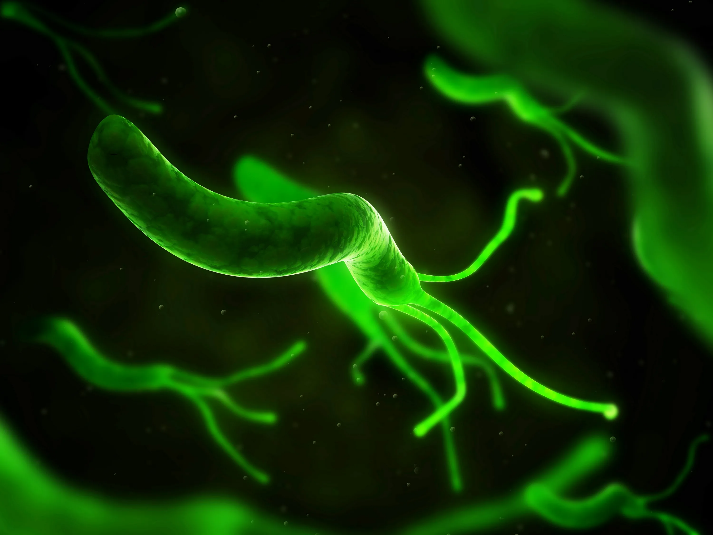
One of the bacteria that has attracted special attention of researchers in recent years is called Helicobacter pylori. It lives in the mucous membrane of the stomach and duodenum of a person, which is unusual in itself: the stomach is washed from the inside by about two liters of gastric juice per day. Gastric juice consists of hydrochloric acid in a high concentration and digestive enzymes, so that it is able to break down the strongest compounds, be it bacteria, viruses or steak. Therefore, for a long time it was believed that the stomach was devoid of flora, almost sterile, and only the unexpected discovery of Helicobacter pylori 20 years ago forced scientists to radically reconsider this point of view.
It turned out that the mucous membrane lining the inside of the stomach and protecting it from the destructive effects of gastric juice is a reliable shelter for bacteria. And it soon became clear that almost all digestive disorders, gastritis and duodenitis, almost 100 percent of duodenal ulcers, 80 percent of stomach ulcers and even many cases of stomach cancer can be safely attributed to Helicobacter pylori. The immune system reacts to the invasion of bacteria into the body, but leukocytes and macrophages, designed to destroy intruders, are unable to penetrate the protective layer of mucus and die, causing considerable harm to the cells of the mucous membrane, which leads to inflammation, ulcers and other troubles.
Fortunately, the bacterium Helicobacter pylori is very sensitive to a wide range of antibiotics, which are today the main weapon against this microbe. At the same time, many medical centers were actively developing a vaccine against Helicobacter pylori, and after a series of setbacks, they have recently achieved significant success. Some researchers believe that mass vaccinations will soon be able to completely save humanity from this scourge.
However, Martin J. Blaser, professor of microbiology at New York University Graduate School of Medicine, has expressed serious concerns about such plans. He believes that Helicobacter pylori also perform a positive function in the body:
“We already have preliminary data that increasingly show that Helicobacter protects the esophagus.
People who do not have bacteria in the stomach are more likely to suffer from esophagitis, that is, inflammation of the esophagus, or gastroesophageal reflux, that is, a violation of the mechanisms that usually prevent the contents of the stomach from being thrown back into the esophagus. “And esophageal cancer is more common in these patients,” says Professor Blazer:
– This seriously worries me: if we start mass vaccination against Helicobacter pylori today in order to reduce the incidence of stomach cancer, then it is very likely that in twenty or forty years we will get an epidemic of esophageal cancer.
However, this, of course, does not mean that patients suffering from, say, a duodenal ulcer do not need to get rid of Helicobacter pylori. Martin Blazer strongly opposes only the general vaccination of the population:
– If such a vaccination will be of any use, then only if we can find out which circle of people is really at increased risk of developing stomach cancer. We believe that various highly individual factors inherent in the host can double, triple, or even quadruple this risk.
Scientists have already discovered the first genetic risk factors. Apparently, the residents of the East Asian countries are most at risk. Martin Blazer says:
– Perhaps these risk factors add up. But not just, but so that two plus two gives nine or even fifteen.
Unusual mathematics. However, it is possible that soon doctors will learn to determine the individual degree of risk for each carrier of the bacterium. True, one cannot do without information about the dietary habits of patients, as well as about the bacteria themselves. Professor Blazer explains:
– The most recent studies, including those carried out in our laboratory, have shown that the degree of risk of disease strongly depends on what strain of bacteria the patient is infected with. There are many strains that are specific to certain regions. Investigating a particular strain, a doctor can say with a high degree of confidence where the patient from whom this sample was taken came from.
And only by bringing together the data on bacteria and data on the patient, the doctor will be able to decide which in this case is more significant – harm to the stomach or benefit to the esophagus.
